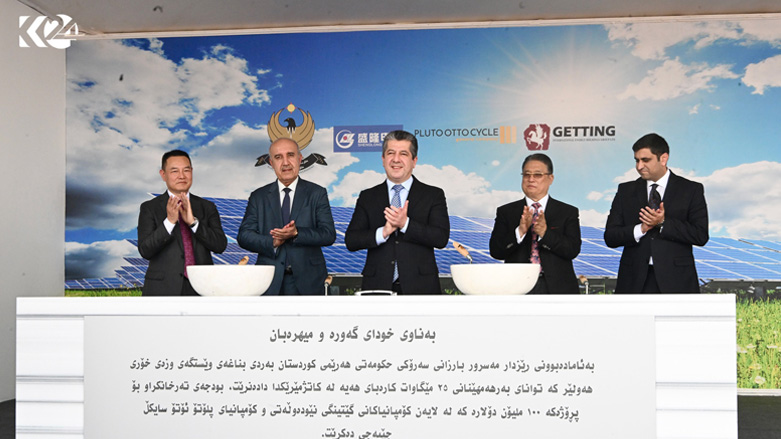PM Barzani laid foundation stone of ‘largest’ solar power plant in Iraq

ERBIL (Kurdistan 24) – Kurdistan Region Prime Minister Masrour Barzani on Thursday laid the foundation stone for the largest solar power plant in the country.
Accompanied by representatives of participating companies, including Getting and Pluto Otto Cycle, and Chinese Shenglong Electric Group Co., PM Barzani announced the start of the project’s construction in Erbil’s southern province.
“I am pleased to lay the foundation stone of the first solar power plant in Erbil,” PM Barzani stated before an audience of government ministers, local officials as well as corporate representatives.
The $100 million project is expected to produce 25 megawatts of electricity per hour, the premier said, extending his appreciation to the Ministry of Electricity and the participating companies for undertaking this “important project.”
“I hope it will serve as a beginning for undertaking similar projects in the future across the Kurdistan Region’s cities,” PM Barzani added, stressing the importance of implementing projects powered by renewable energy.
As part of the Ministry’s efforts to increase power production to meet the rising demand for electricity, the government relies on using solar and other forms of clean energy, the premier said.
The plant’s construction is set to be inaugurated within a year. Its production will feed into the national grid that currently provides 3,500 megawatts.
The Kurdish region is able to produce more than 7,000 megawatts if sufficient energy is supplied, according to electricity ministry officials.
PM Barzani hailed the Ministry’s reform measures in the electricity sector by curbing power theft and waste by smart meters.
Despite increased production and the establishment of power plants, the Region is still unable to provide 24-hour electricity to its citizens, mainly due to rising demand and population growth, the official explained.
The government spends “millions of dollars” annually to provide heavily-subsidized power to the public, he said.
In order to fill the gap of government shortages, citizens and businesses often rely on private generators to supplement their electricity, which generally costs more. Thousands of diesel-based private generators are seen across towns and cities of the Kurdistan Region.
If people had to pay their electricity bills in full, PM BarzanI reasoned, the government would be able to provide sufficient power for a cheaper price than the private sector.
